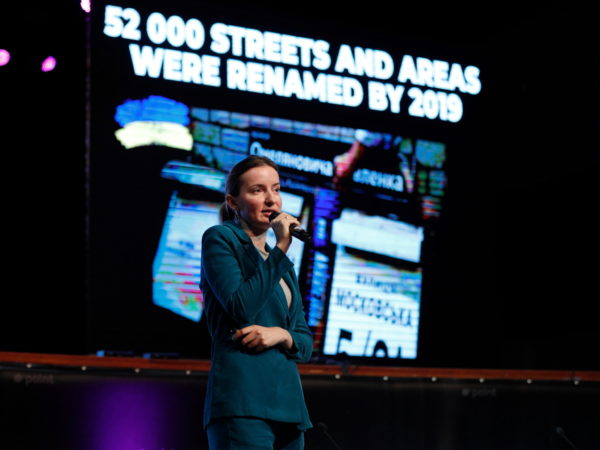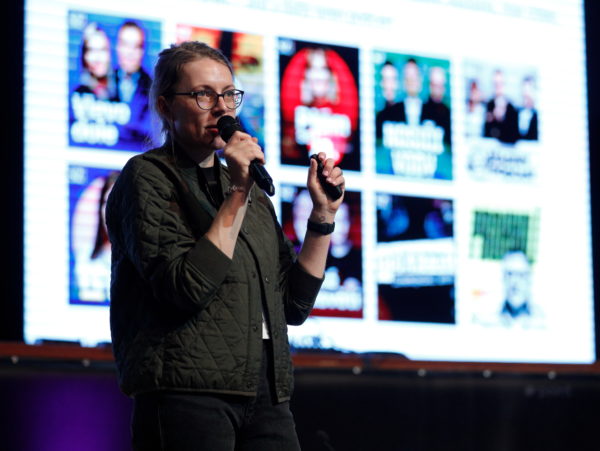Transforming the media: How Youtube and podcasts changed the media space
The third and fourth panels at the POINT 1011 Conference, held on the 15th of June 2023, discussed the effects of Youtube and podcasts as default outlets in the (social) media space in recent history. Darka Hirna from Faces Of Independence (Ukraine) and Hanna Nemeckova from Seznam Zprávy spoke at the panel about the influence of Youtube and podcasts on the media space, respectively. Key points made at the panel included the revision of history in Ukraine, the “Youtube bubble growth” in Ukraine, the importance of topical diversity in the podcast world and ways to expand the audience. This segment of the POINT 1011 program is realized in partnership with Mixer.

Photo: Vanja Čerimagić
Effects of Youtube in Ukraine
Jakub Górnicki (Mixer) introduced Darka Hirna, a journalist and YouTuber running the Faces Of Independence channel in Ukraine. Hirna stated that her career made a shift from the traditional media outlet – television, to a more modern one – Youtube, which became the most popular outlet to receive information in Ukraine since the start of the full-scale invasion. Due to the invasion, the “TV marathon”, as she stated, was created as a collaboration of all national TV media outlets in Ukraine. She focuses primarily on national memory policy, history and the Ukrainian liberation movement in the past century. Contrary to the global popular belief that Ukrainian independence started in 1991, the more popular assumption in Ukraine is that the Revolution of Dignity in 2013 was the initiating event for independence. Reevaluation of history and Ukraine’s Soviet past began that year, including the decriminalization process and demolition of communist monuments and toponyms from the public space. By 2019 Ukrainians actually demolished 2,500 monuments from the communist era, she stated, which resulted in “space emptiness”.
“One of the most important things that happened during the Revolution is that KGB/USSR archives were declassified which means that journalists got access to the millions of documents of USSR, which means that we could start to research it and spread and debunk some Russian historical propaganda”, Hirna stated. This did not have a major impact on Ukraine, as one third Ukrainians felt nostalgic towards the USSR by 2020, due to the influence of Russia and pro – Russian television channels. Hirna then spoke about Volodymyr Zelensky, the then-candidate for the presidency and his effects on the general historical narrative.
“President Zelensky, who was a candidate for the president, came with the narrative that there is no difference in what views on history you have because he wanted to unite Ukrainians from different groups and bubbles. And as long as one third Ukrainians felt nostalgia towards Russia and USSR, he also appealed to those people”, she mentioned. He was successful in his plans as he won the election.
Darka then spoke about her personal experience and the time of the presidential elections in Ukraine in 2019. During that time she met a human rights activist in the USSR, one of the first founders of the first human rights group that fought against Ukrainian discrimination. Furthermore, he spent 12 years in USSR labour camps but was unknown to the Ukrainian public. Due to the lack of acknowledgement, he was living in poor conditions. Hirna mentioned her career as a television journalist during that time, stating that due to policy she was bound to work on topics that gained public views, which were not in line with her interest, leading to her transfer to Youtube.
“Actually, we now have a very big boom of Youtube channels in Ukraine, in particular historical Youtube channels. There is a huge interest in history now because lots of Ukrainians, after the full-scale invasion, lost the cultural floor because they were disappointed in Russia”, Hirna mentioned. She focused on the living conditions of veterans in Ukraine, travelling to 18 cities and villages in Ukraine and collecting 41 stories, which was her launching point of the Faces Of Independence channel. “Ukrainian dissidents” is a playlist of stories on her channel.
Hirna then spoke about the narrative shift due to the invasion. The Ukrainian parliament adopted the Decolonization law, which banned Russian symbols and propaganda while criminalizing Russian imperialism. This was her inspiration to start the blog with a focus on the lifestyle and portrayal of the Ukrainian lifestyle during the USSR. Furthermore, she focused on Russian literature domination in Ukrainian homes, which started during the ’60s. Russification of Ukraine is one of her topics, which was inspired by her life in the western part of Ukraine where access to Ukrainian language, literature and press was limited.
“Due to the war, our army was decriminalized as well for the last eight years, so all the symbols on military units were changed. It has really deep historical roots so it was very interesting to research what each of them means and how far in Ukrainian history it goes,” she said. She spoke about the success of her Youtube channel and other channels as well. Her focus now, as she mentioned, is to gain additional subscribers but also to weekly present interviews with military combatants focusing on the revelation of history, who currently are also discovering new historical facts. “Public request for revision of history in Ukraine is very high now. We have an infinite number of unexplored archives and actually, we have a lot more to do with the history of decriminalization and decolonization”.
Finally, she concluded: “Why Youtube? Because obviously there’s a lot of freedom. I get feedback from my audience immediately and that helps me to get better in my coverage. I think this is the best time for Ukrainian Youtube because it’s on the rise and it’s a good moment to start”.
Ways to grow your podcast
Górnicki then introduced Hanna Nemeckova from Seznam Zprávy, the largest independent online media in Czechia. It was developed by Seznam, the Czech search engine founded in the 90s, developing into a news-gathering platform. Investigative reporting, analytical content, opinion journalism and podcasts are major parts of the content of Seznam Zprávy, leading it to be a leader in the segment of investigative news and political content in audio in Czechia.
“Seznam is a really dominant player”, Nemeckova mentioned while presenting the platform’s outreach (seven million real or unique users per month; Seznam Zprávy reaches about 4.5 million users monthly). In the past three to four years about 15 to 20 shows, with a focus on politics, investigative reporting, and daily news while also focusing on marginal themes such as culture, true crime, food, satirical podcast, etc. Most of the audience comes from third-party platforms, such as Spotify.
Hanna mentioned that her journey at Seznam started in late 2019 when it began its rebranding to a “prestigious, quality reading with the most well-known authors in the Czech Republic in general reporting”. Although she used more traditional outlets such as newsletters to reach out to new audiences, Nemeckova’s first idea was to dive into the podcast world, as it was already gaining popularity in the Czech Republic. “This pandemic bubble is starting to burst a little bit”, Nemeckova mentioned, while comparing the number of podcasts in 2022 and 2020.
When speaking about the audience, Hanna mentioned that the audience is predominantly male with an age bracket of 28 – 34 years, which relates to data from other countries. The first show was a major success due to its (back then) unusual format – presenting two hosts discussing one topic while presenting their expertise in an open and friendly way. “What was amazing is that the listeners reacted almost immediately to the atmosphere of the podcast and the chemistry between the two reporters”, she stated while discussing the influence of the podcast.
Nemeckova also spoke about the production models and the approach to launching new shows, concluding that internal talent is very successful if there is a previous relationship and chemistry between hosts. External talent is also important, giving a great opportunity to present different views on topics such as finance, football, etc. “Must have” formats are key to gaining an audience, one of them being a daily podcast, political interviews, etc. Nemeckova also spoke about “blockbuster” podcasts – limited-time shows with a more expensive and extensive production but also a great listener response. Such an approach managed to produce the most successful podcast with a total of five million listens.

Photo: Vanja Čerimagić
“Content exchange is something that we do to help ourselves but also two Czech NGOs,” Nemeckova stated when speaking about sharing the platform for a more social benefit approach. When speaking about monetization, Hanna spoke about the “depressing” condition of the financial state of media in Czechia. Due to the “free” nature of Seznam Zprávy podcasts, in other words, them being ad-based podcasts, finances are gained through the input of ads in web page audio content. When speaking about ads on third-party platforms, Nemeckova mentioned that the audience sometimes does not respond well to inserted ads due to paying for premium use of Spotify, for example.
In some of her final notes, Nemeckova pointed out: ”As long as you’re growing, it’s not a bad thing to have that many podcasts”. The growth of Seznam Zprávy is still large, mostly due to different podcast content which allows outreach to different audiences. This additionally does not affect growth when hosts leave or when staff changes occur. Nemeckova also spoke about the oversaturation in the podcast space, concluding that even popular hosts need to be aware of the saturation of content. Live tapping is a great way to gain audience attention, she mentioned, as it gives a more approachable and personal experience to both hosts and listeners.
In her conclusion, Nemeckova spoke about the importance of trust. “The podcast journalists or hosts are very connected to their audience and their listeners, and it goes vice versa”, which is not the case with TV hosts and their audience, Hanna said.
Author: Ivana Vučetić